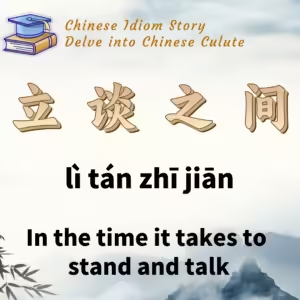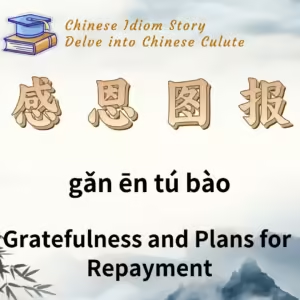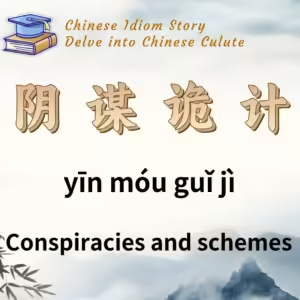
Chinese Idiom: 深谋远虑 (Shen Mou Yuan Lv)
English Translation: Deep planning and far-reaching consideration
pīn yīn: shēn móu yuǎn lǜ
Idiom Meaning: To have thorough and far-sighted plans; to think carefully and strategically.
Historical Source: From the Han Dynasty essay “On the Fall of the Qin” (《过秦论上》) by Jia Yi.
Idiom Story:
Jia Yi was an outstanding politician and writer during the early Western Han Dynasty. His works include the “New Book” (《新书》), consisting of ten volumes and fifty-eight essays. Among his political writings, “On the Fall of the Qin” (《过秦论》), “Memorial on Political Affairs” (《陈政事疏》), and “On Storage Policies” (《论积贮疏》) are particularly renowned.
In “On the Fall of the Qin,” Jia Yi criticizes the mistakes of the Qin Dynasty. He begins by analyzing the reasons behind its downfall and advocates for the implementation of benevolence and righteousness in governance. He urges the ruling class to take the Qin as a cautionary tale to achieve long-term peace and stability. However, given the historical context, Jia Yi was unable to fully identify the true causes of the Qin’s collapse and did not adequately appreciate the power of the people. Nonetheless, his analysis and certain proposals still held some benefits for the common people at the time.
In this essay, when discussing the peasant uprisings at the end of the Qin Dynasty, Jia Yi states:
“Moreover, the world is not small or weak; the fertile land of Yongzhou, the solid defenses of the Xiaoshan and Hangu Passes, remain unchanged. Chen Sheng’s position is not as respected as those of the lords of Qi, Chu, Yan, Zhao, Han, Wei, Song, Wei, and Zhongshan. The tools used in farming are not as sharp as the halberds and long spears; the hundreds of soldiers exiled to guard the borders cannot match the strength of the armies of the Nine States. The deep planning and far-reaching strategies of military operations cannot compare to those of past strategists. However, success and failure are different, and achievements can vary… The absence of benevolence and righteousness alters the situation of attack and defense.”
This passage emphasizes that at that time, the ruling power of the Qin had neither diminished nor weakened. The fertile lands of Yongzhou and the strategic strongholds of the Xiaoshan and Hangu Passes remained the same as before. Chen Sheng’s (Chen Sheng was one of the leaders of the peasant uprising) status was not as esteemed as the lords of the various states; the tools used for farming were not as formidable as the halberds and long spears; the hundreds of exiled soldiers guarding the borders were no match for the armies of the Nine States. The strategic insight and military methods of that time were not as competent as those of earlier strategists and generals. Yet, despite these advantageous conditions, the Qin ultimately faced failure, while Chen Sheng, in adverse circumstances, achieved victory. The reason for this discrepancy lies in the Qin Dynasty’s failure to implement benevolent governance, which created a situation entirely different from the past.






